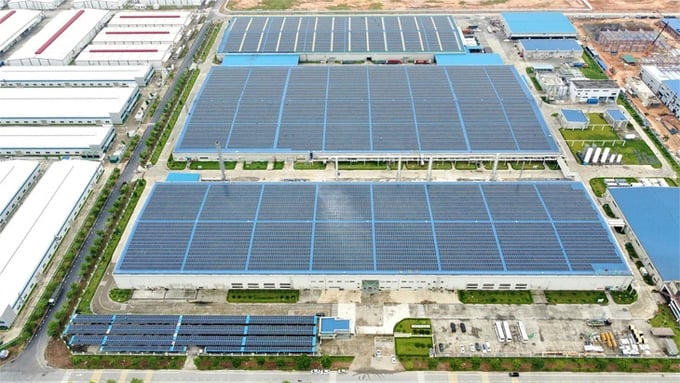November 25, 2025 | 10:39 GMT +7
November 25, 2025 | 10:39 GMT +7
Hotline: 0913.378.918
November 25, 2025 | 10:39 GMT +7
Hotline: 0913.378.918

Businesses have committed to building carbon-neutral factories and reducing emissions. In the photo: a factory using 100% solar power in Vietnam. Photo: T.S.
In mid-May, Pandora Group will start constructing a factory worth more than USD 150 million in Binh Duong. To decide to locate in Vietnam, the world's largest jewelry group carefully selected 27 other countries to consider the advantages of each country.
What's special is that when deciding to build a factory in Vietnam, Pandora Group will build a factory that meets LEED Gold standards (a prestigious green building certification issued by the US Green Building Council) and will use 100 % recycled energy. This will also be the group's third factory, which uses 100% electricity from renewable energy sources, compared to the previous two factories, both of which used solar power.
Right next door, the Lego Group will also build a 50MW solar power farm, which is expected to be deployed next to the toy factory, and install an additional 4MW of rooftop solar power so that the above power sources serve production activities by Lego.
Meanwhile, Trina Solar Company has built and operated a factory in Thai Nguyen that uses 100% solar power. This factory has an area of more than 160,000m2. The entire roof system is installed with solar power with a total capacity of 12.6MW.
Mrs. Elva Wang - Head of South East Asia, Trina Solar Asia Pacific - said that factories increasing the use of solar power and installing electricity storage systems will help factories be proactive in energy and reduce carbon emissions towards sustainable development.
As an enterprise with many factories in Vietnam, Nestlé Group said that it is committed to reducing emissions by 20% by 2025 and 50% by 2030 so that by 2050 net emissions will be zero. By 2023, this business has reduced emissions by 13.58% thanks to efforts to change production processes.
Mr. Pham Van Viet - vice president of the Ho Chi Minh City Textile, Garment and Embroidery Association - said that reducing emissions in units exporting to demanding markets such as the EU and Japan is gradually becoming urgent. Therefore, many businesses have had to use machines that consume less electricity, convert boiler technology, and install solar power on factory roofs to meet green criteria and reduce emissions.
Translated by Huong Giang

(VAN) Viettel is applying automation technology that helps Vietnamese agro-products clear customs more quickly, cut costs, and maintain quality.

(VAN) Vinh Long, Viet Nam’s ‘coconut capital,’ is facing a major opportunity to advance sustainable agriculture by reducing carbon emissions from cultivation.

(VAN) Ho Chi Minh City still has many areas for improving forest quality, saving energy, reducing emissions, and generating carbon credits.

(VAN) ILDEX Vietnam 2026 will connect more than 250 exhibitors and 10,000 visitors from 40 countries.

(VAN) Hue City is accelerating efforts to combat IUU fishing, aiming to remove EC’s 'yellow card' and promote sustainable fisheries development.

(VAN) The recent torrential downpours and unprecedented flooding in the Southern Central Coast are a highly unusual meteorological and hydrological event.

(VAN) The Southern Central Coast and Central Highlands regions have suffered massive agricultural losses, with over 80,000 hectares of rice and crops, alongside millions of livestock, being swept away, causing severe damage to farmer livelihoods.